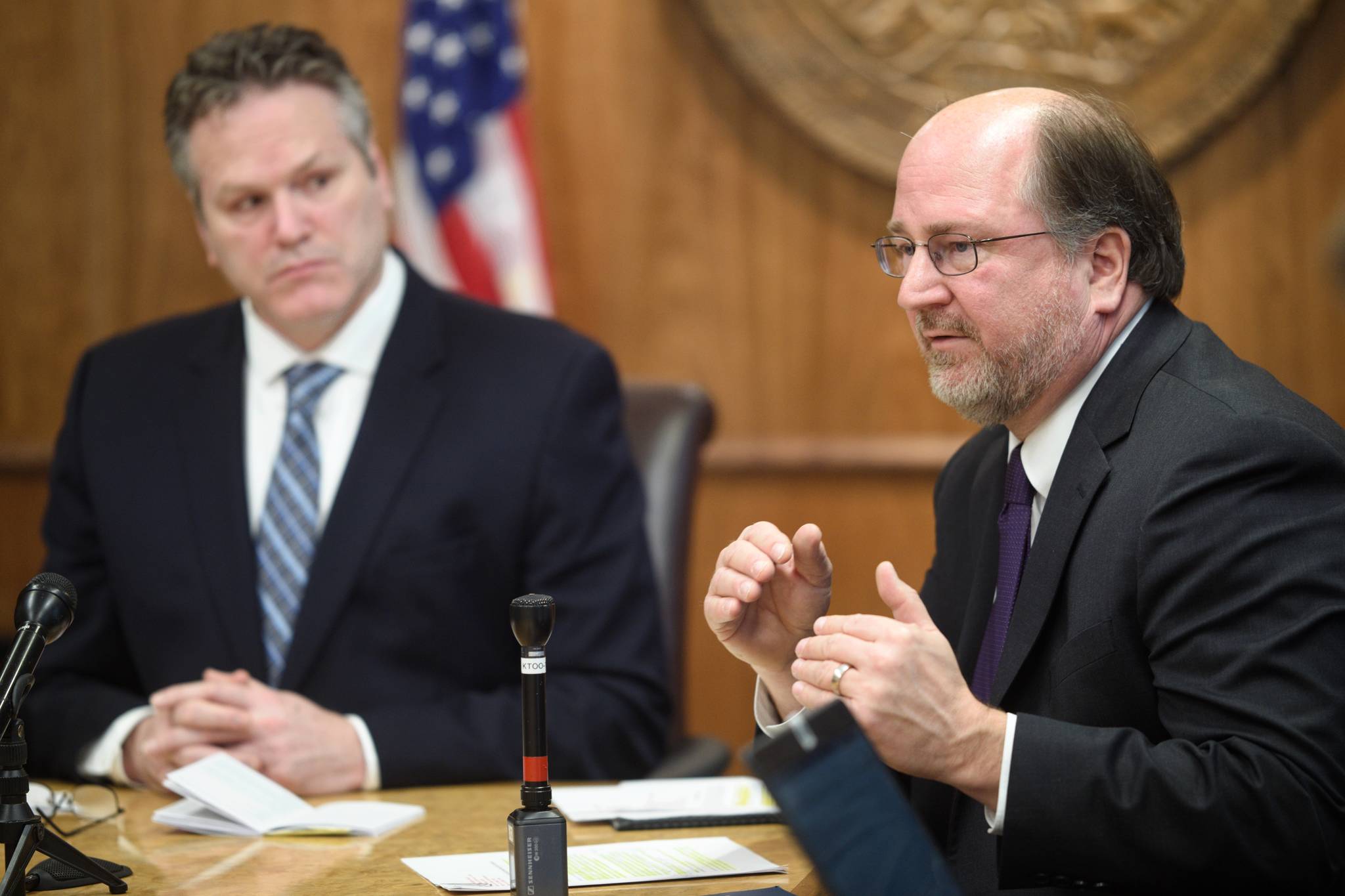Gov. Mike Dunleavy’s trio of constitutional amendments released Wednesday followed up on his campaign promises, but there’s doubt even within his own party about whether the amendments can get enough support in this session to become law.
The theme of all three amendments, Dunleavy said in a press conference Wednesday, is to shift power from the Legislature to the people.
“We are limiting the Legislature,” Dunleavy said. “That’s the purpose of the Constitution.”
The first of the three amendments would protect the Permanent Fund Dividend, guarding it from appropriations, the Legislature or a governor’s veto. Any changes to the PFD formula would require a vote of the people.
The second proposed amendment states that any new tax or tax rate increase passed by the Legislature would also require a vote from the people. It also requires that any new tax or tax increase passed by voters on a ballot initiative would also require approval by the Legislature.
The final amendment unveiled Wednesday would essentially establish a spending cap for the state. The cap would be the result of a formula that uses a three-year average of state spending, and lawmakers could only exceed that amount by a small amount. That amount of increase would be either 2 percent or an amount determined by the state’s inflation or population change, whichever is smaller.
[Governor’s bills include $20M slash to education]
The amendment would also establish a new savings fund called the Constitutional Savings Fund, which would require only a 51 percent majority from the Legislature if lawmakers wanted to draw from it. This is compared to a three-quarter majority that’s currently required by the Constitutional Budget Reserve. Attorney General Kevin Clarkson explained at Wednesday’s press conference that while this account is easier to access, the Constitutional Savings Fund can only be used below the spending cap set by the earlier part of the amendment.
Dunleavy’s campaign leaned heavily on providing a robust PFD for Alaskans, and he has talked about finding a way to a balanced budget that doesn’t require reducing PFDs or instituting new taxes. The amendments square with those priorities, and Dunleavy said he believes these changes need to be made sooner rather than later to help the state out of its current economic downturn.
“This is going to right the ship,” Dunleavy said. “It’s not going to be easy, but I think intuitively, we all know it needs to be done. We need to fix this now. We don’t have tomorrow.”
Will they get enough support?
To pass an amendment into effect, it must receive two-thirds vote in each the House and Senate and then be approved by the voters in the following general election.
Dunleavy, a Republican, said he was hopeful that the amendments can get enough support from the Legislature, including the House, which is so divided that it still hasn’t formed a majority through the first 16 days of session.
Others on both sides of the aisle aren’t confident that the amendments will get that kind of support. Sen. John Coghill, R-North Pole, said the proposed amendments do a good job of raising questions for the future, but the chances of one of them making it through the Legislature during this session are slim.
“I have a feeling that it’s going to be very difficult to get the higher majority, the two-thirds majority vote, to get it through both bodies this session,” Coghill said. “That gives us two years to look at it and probably have an engaged conversation both with the governor and with the rest of the people in Alaska.”
[‘The $1.6B problem’: Senators, commissioners gear up for budget challenge]
Coghill said one of the main questions these amendments raise is whether Alaskans want to live in a representative democracy or a true democracy. With these amendments giving so much power to voters, Coghill said, they would signal a shift away from putting the power in the hands of elected legislators. He said these amendments would put Legislators in a “defensive position.”
A side effect of a weaker Legislature
Putting the Legislature in a weakened position, argued Rep. Matt Claman, inherently gives more power to the governor. Claman, a Democrat from Anchorage, said he believes it’s vital for the Legislature to be a check and balance to the executive branch.
“Knowing that we have a strong governor form of government, I’m very hesitant to support anything that even further limits the power of the Legislature to provide that check and balance,” Claman said in a press conference Wednesday.
Claman didn’t want to speculate on whether the amendment would be able to get the kind of support necessary to bring it into effect, but said he’s learned in his four years in the Capitol that it’s extremely difficult to get that kind of support for a huge change like this.
There have been 28 amendments to Alaska’s constitution, but only one in the past 21 years. The most recent approved amendment was in 2004, when an amendment increased the number of districts that have to be represented on a petition for an initiative to be put on the ballot. The most recent amendment that got approval from the Legislature was in 2010 — which would have increased the number of legislators and districts — but the public voted it down.
• Contact reporter Alex McCarthy at 523-2271 or amccarthy@juneauempire.com. Follow him on Twitter at @akmccarthy.

